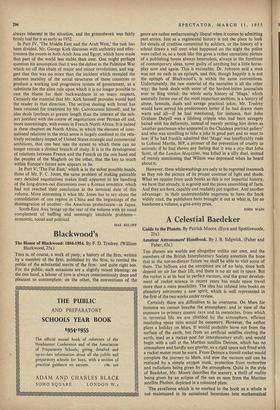Blackwood's
The House of Blackwood: 1804-1954. By F. D. Tredrey. (William Blackwood, 25s.)
THIS is, of course, a work of piety; a history of the firm, written by a member of the firm, published by the firm, to remind the public of the substantial merits of the firm : and quite right too. For the public, such occasions are a slightly mixed blessing; on the one hand, a labour of love is always conscientiously done and pleasant to contemplate; on the other, the conventions of the genre are rather embarrassingly liberal when it comes to admitting past errors. Just as a regimental history is not the place to look for details of cruelties committed by soldiers, or the history of a school draws a veil over what happened on the night the police were called in, so a book like this gives a rather unrealistic picture of a publishing house always benevolent, always in the forefront of contemporary ideas, never guilty of anything but a little horse- play now and again. This is excusable; Dr. Johnson said a man was not on oath in an epitaph, and this, though happily it is not the epitaph of Blackwood's, is within the same conventions. Unfortunately, the raw material of the narrative is all the other way; the book deals with some of the hardest-bitten journalists ever to fling vitriol; the whole early history of 'Maga; which naturally forms one of the most important sections, is a history of abuse, lawsuits, duels and savage practical jokes. Mr. Tredrey would have served his predecessors better if he had drawn them warts and all—if he had mentioned, for instance, that John Graham Dalyell was a lifelong cripple who had been savagely baited with his deformity, instead of merely putting him down as 'another gentleman who appeared in the Chaldean portrait gallery' and who was unwilling to take a joke in good part and so went to law; if he had frankly admitted that 'Maga' was insufferably rude to Colonel Martin, MP, a pioneer of the prevention of cruelty to animals; if he had shown any feeling that it was a pity that John Scott, of the London Magazine, was killed in a silly duel, instead of merely mentioning that Wilson was depressed when he heard about it.
However, these whitewashings are only to be regretted inasmuch as they rob the picture of its proper contrast of light and shade. What we rgquire from such books as this is not impartial history; we have that already; it is gossip and the pious assembling of facts. And they are here, capably and readably put together. And another advantage: in their understandable eagerness to have the book widely read, the publishers have brought it out at what is, for so handsome a volume, a give-away price.
JOHN WAIN










































 Previous page
Previous page